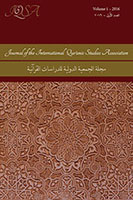The word nabtahil, which appears only once in the Qur’an in Q 3:61, has become the basis of a fairly well-known practice in pre-modern and modern Islam called mubāhala, “mutual cursing” due to the verse’s alleged connection to a cursing duel between Muhammad and Christians from Najran. Some exegetes, however, took it to mean “to pray humbly/sincerely”. This article argues that among the two explanations offered by Muslim scholars and exegetes for ibtahala, “to pray” and “to curse”, the latter is quite probably incorrect and arose from a misinterpretation of the word’s solitary usage in the qur’anic verse whereas the former explanation fares better in view of the comparative Semitic evidence. Having evaluated the attestations of the word in Muslim sources and in other languages, I offer a third explanation, namely that the word ibtahala means “to debate”, based on a Classical Ethiopic cognate.
Download Resource
The word nabtahil, which appears only once in the Qur’an in Q 3:61, has become the basis of a fairly well-known practice in pre-modern and modern Islam called mubāhala, “mutual cursing” due […]

